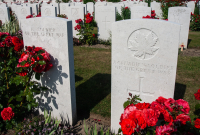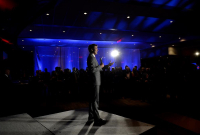Support strong Canadian climate journalism for 2025
A series of international leaders used a global commemoration of the end of the First World War to warn about the risk politicians who call themselves nationalists pose to a fragile peace, in a message aimed at the American president.
What started with the French president saying that nationalist leaders threaten to erase a nation's moral values by putting their own interests first regardless of the effects on others, ended with Prime Minister Justin Trudeau saying voters will turn for easy answers and scapegoats.
U.S. President Donald Trump in recent weeks described himself as a nationalist and has frequently sparred with the media, whom he has labelled as "fake news" and the enemy of the people — both of which were on display last week in a free-wheeling press conference after the U.S. midterm elections.
Speaking at a peace forum organized by French President Emmanuel Macron, Trudeau said attacks on the press are a lever some use to fuel anxiety about automation of jobs, international trade and ultimately "undermine our trust in institutions and increase our cynicism."
A bulwark against that was a "robust, respected media" that is under stress, Trudeau said to a crowd of about 150 people.
"Attacks on the media are not just about getting your preferred political candidate elected, for example, they are about increasing the level of cynicism that citizens have towards all authorities, towards all of the institutions that are there to protect us as citizens," he said.
"When people feel their institutions can't protect them, they look for easy answers in populism, in nationalism, in closing borders, in shutting down trade, in xenophobia."
Macron, Trudeau and other leaders came to Paris hoping to use the 100th anniversary of the end of the First World War to renew calls to quash festering tensions across the globe.
Macron warned how fragile peace can be in an age where the tensions that gave rise to four years of bloody battle, costing millions of lives, appear to be festering again. He told the assembled masses that the "traces of this war never went away."
He urged the leaders present to promise their peoples that the resurgent "old demons" would not be able to return, sowing "chaos and death."
Though Trump sat mostly stone-faced as he listened to Macron's words, he had left by the time Trudeau began to speak at a memorial at an American military cemetery outside Paris. At the event, Trump said it was "our duty to preserve the civilization" downed soldiers fought to defend, "and to protect the peace they so nobly gave their lives to secure one century ago."
Yet at almost the same time, German Chancellor Angela Merkel, in her opening speech at the peace forum, spoke about how lack of communication and an unwillingness to compromise can have dire consequences for countries — again in a veiled message towards Trump.
"There is a general sense and desire among many countries, including Canada, to do whatever is possible to sustain the institutions of the international order and practical, multilateral co-operation. And so you see that in Canada, you see that in Germany," said Roland Paris, Trudeau's former foreign adviser.
"Macron (is) essentially making that point: that we can sustain co-operation, we must sustain co-operation."
Trudeau, who is on a 10-day trip across Europe and Asia, will come face-to-face with three of the nations sowing tension: Trump, Russian President Vladimir Putin and Chinese President Xi Jinping.
Trudeau sat beside Putin at the peace conference and the pair briefly chatted at the opening session of Macron's peace summit on Sunday. Trudeau's office said he acknowledged the Russian people's sacrifices through the two world wars and reiterated the importance of Russian representation in Paris to talk about peace.
Earlier in the weekend, Trudeau spoke with Trump at a dinner Macron organized on Friday night — although government officials wouldn't say the exact topic of conversation.
Trudeau has had to navigate the mercurial American president, and talked pointedly about him on Sunday afternoon, but never mentioned Trump by name, as he is prone to do.
Trump did not shake Trudeau's hand when he arrived with wife Melania at the iconic Arc de Triomphe for the Nov. 11 ceremony. Neither Trump nor Putin walked a bit of the Champs-Elysee with other leaders after church bells rang out as the hour turned to 11 a.m. local time, marking the moment the guns fell silent across Europe a century ago.
France's ambassador to Canada described the peace forum as a way to amplify the voices of non-governmental organizations and prod political leaders present to commit to Macron's call for peace.
"If you're not backed up by the highest political authority, nothing will happen," Kareen Rispal said in an interview Friday.
"You have to get the real commitment from the political leaders."
Rispal also said Trudeau's appearance at the Arc de Triomphe ceremony would be a reminder of Canada's contributions during the war, which aren't always recognized in Europe.
Some 650,000 Canadians and Newfoundlanders served in the First World War, and more than 66,000 of them lost their lives. About 172,000 more were injured.
Others served behind the front lines, working with locals to aid the war effort.
"We as French, we as Europeans — I think we don't value enough the effort made by the Canadians," Rispal said in an interview Friday.
— With files from the Associated Press.




Comments
I'm proud of our nationhood. Those who fought and died defending it would never have voted for Pierre or Justin. Justin is a divisive influence on Canada.